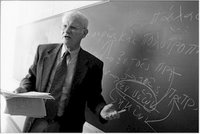
Monday, November 27, 2006
Justification and A Tale of Two Imperial Cities

Anthony Lane's writes in an article entitled "A Tale of Two Imperial Cities" about how "[i]n 1541, leading Protestant and Roman Catholic theologians meeting at the Regensburg Colloquy produced an agreed-upon statement on the doctrine (justification). A few years later the Council of Trent defined the doctrine in a deliberately anti-Protestant manner, rejecting the position agreed at Regensburg" [1]
Lane concludes that in Regensburg, both major Protestant and Catholic theologians believed in two types of righteousness, by which Christ's imputed rightousness is the basis for justification.
"At Regensburg, Protestant and Roman Catholic theologians reached a temporary agreement on justification. This was based upon the acceptance of both inherent and imputed righteousness and on the recognition that because of the imperfection of our inherent righteousnes, Christ's righteousness needs to be imputed to us in order for us to be acceptable to God. " [2]
Lane also concludes that the Council of Trent was deeply anti-Protestant, but warns us not to equal modern Catholic belief of justification with the "Tridentine Decree"
"The Tridentine Decree on Justification is a vitally important document, but we must not a fall into the mistake of simply equating it with the Catholic doctrine. Trent is what the Roman Catholic Church chose to say at that time in response to what it then understood the Reformers to be saying. To understand what the Roman Catholic Church today is saying to what it now understands Protestants to teach, we need to listen to contemporary Roman Catholic theology." [2]
[1] Article found in the book "Justification in Perspective:Historical Developments and Contemporay Challenges" edited by Bruce McCormack pg. 119
[2] pg142
Tuesday, November 07, 2006
A Warning in the Imputation Debates

Simon Gathercole writes:
"A statement by Robert Gundry on the (non) imputation of Christ's righeousness in particular has sparked a response by John Piper, and Gundry and Don Carson have also entered the same debate from different stances. It is not not my purpose here to enter this debate. But it should be said that there is clearly a great deal of diversity of opinion on the matter. This is, of course, not sufficient in itself to let discretion take the better part of valor. But in case, the diversity seems to arise out of the complexity of the New Testatment evidence, not because one side is particularly hidebound to tradition and the other wallowing in the desire for novelty or for doctrine that is more amendable to culture. I would not myself deny this traditional understanding of imputation. Still, because of the complexity of the issue, I would propose that the requirement that is is specifically Christ's righteousness that is imputed to believers should not feature on evangelical statement of faith. To make such a finely balanced point an article of faith seems a dangerous strategy. Nonetheless, it is very clear that justification is still christological through and through. Both the cross and the present action of Christ are the vital grounds of justification." [1]
[1] pg 223 of "Justification in Perspective: Historical Development and Contemporary Challenges", edited by Bruce McCormack
Monday, November 06, 2006
Gaffin on Definitive Sanctification

"Further, for Paul sanctification is not only a process involving us in our activity but is also and first of all "definitive sanctification," a decisive, definitive, once-for-all act of God, underlying our activity. A central point of Romans 6-7, for instance, is that while sin is a reality for the believer, it is not my Lord. Because of union with Christ in his death and resurrection I am no longer sin's slave. Sin indwelling but not overpowering; for the believer indwelling sin is not enslaving sin." [1]
"The deepest motive for our sanctification, for holy living and good works, is not our pyschology, not how I"feel" about God and Jesus. Nor is it even our faith. Rather, that profoundest of motives is the resurrection power of Christ, the new creation we are and have already been made a part of in Christ by his Spirit." [2]
[1] "By Faith, Not By Sight: Paul and the Order of Salvation" pg 77-78
[2] pg 78
Sunday, November 05, 2006
Subscribe to:
Posts (Atom)




